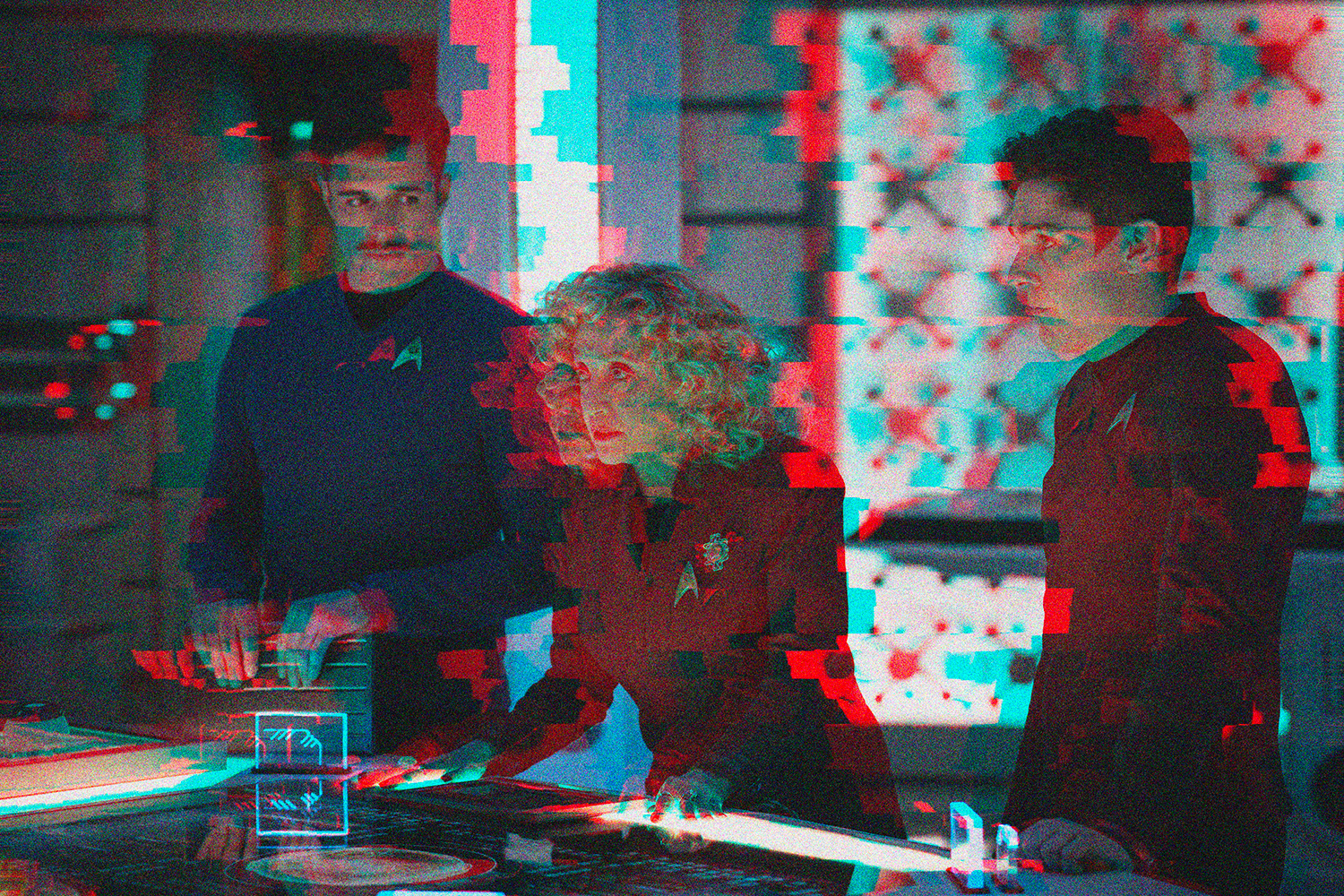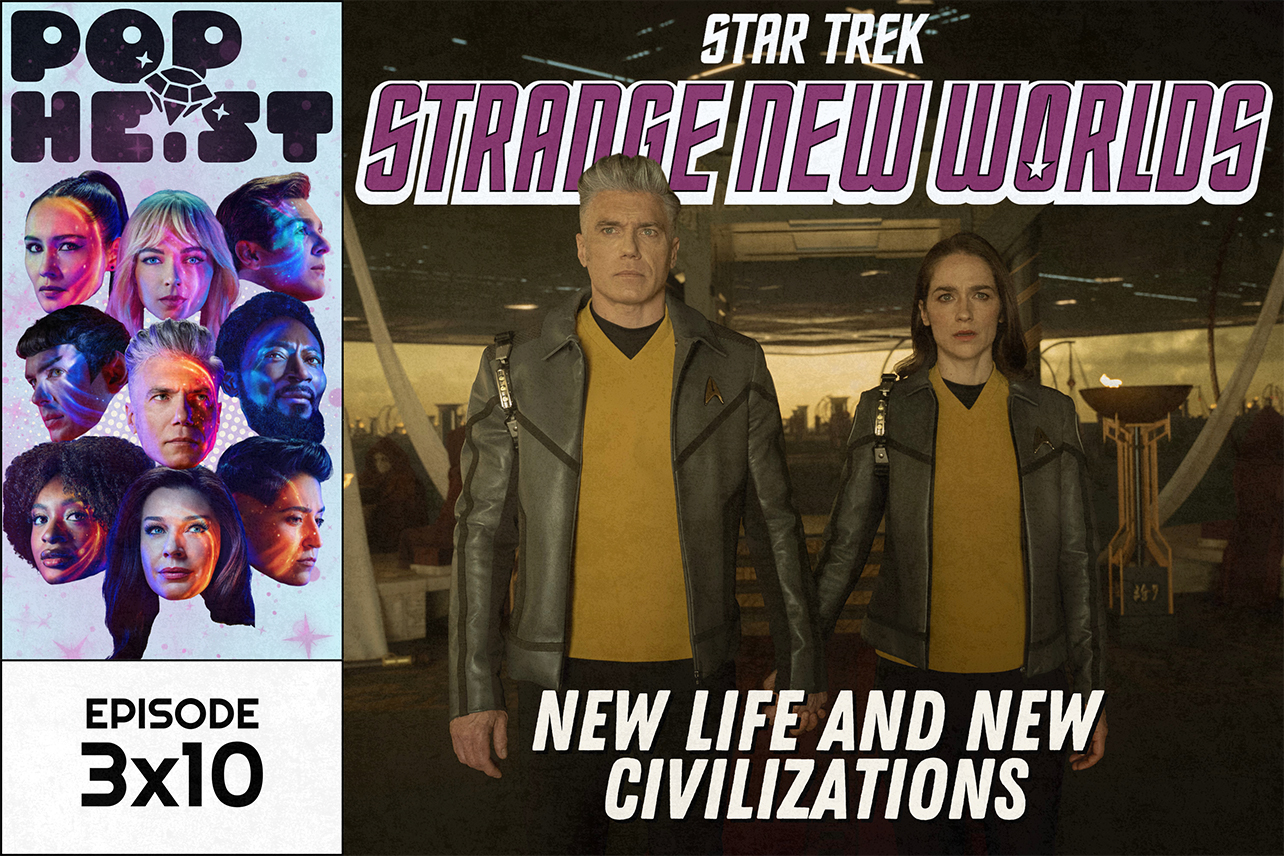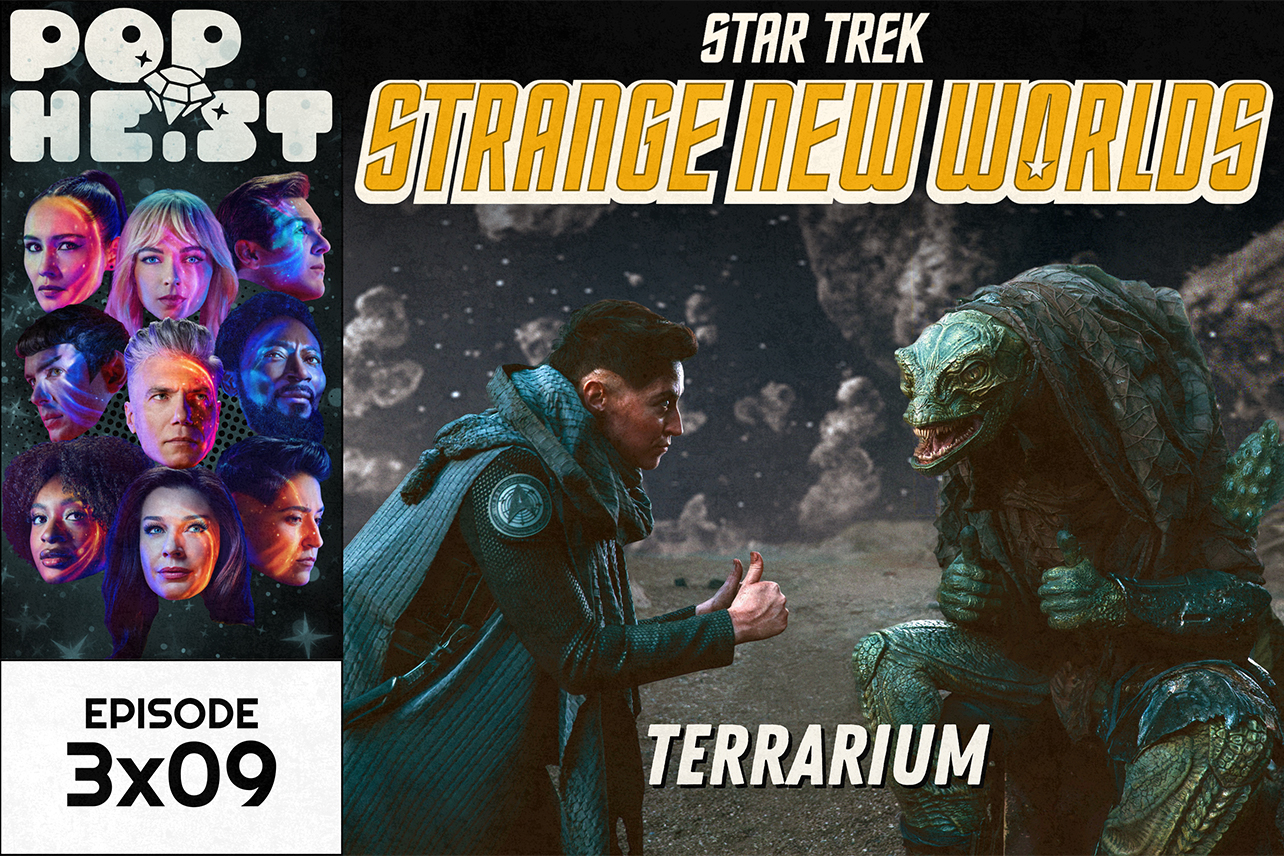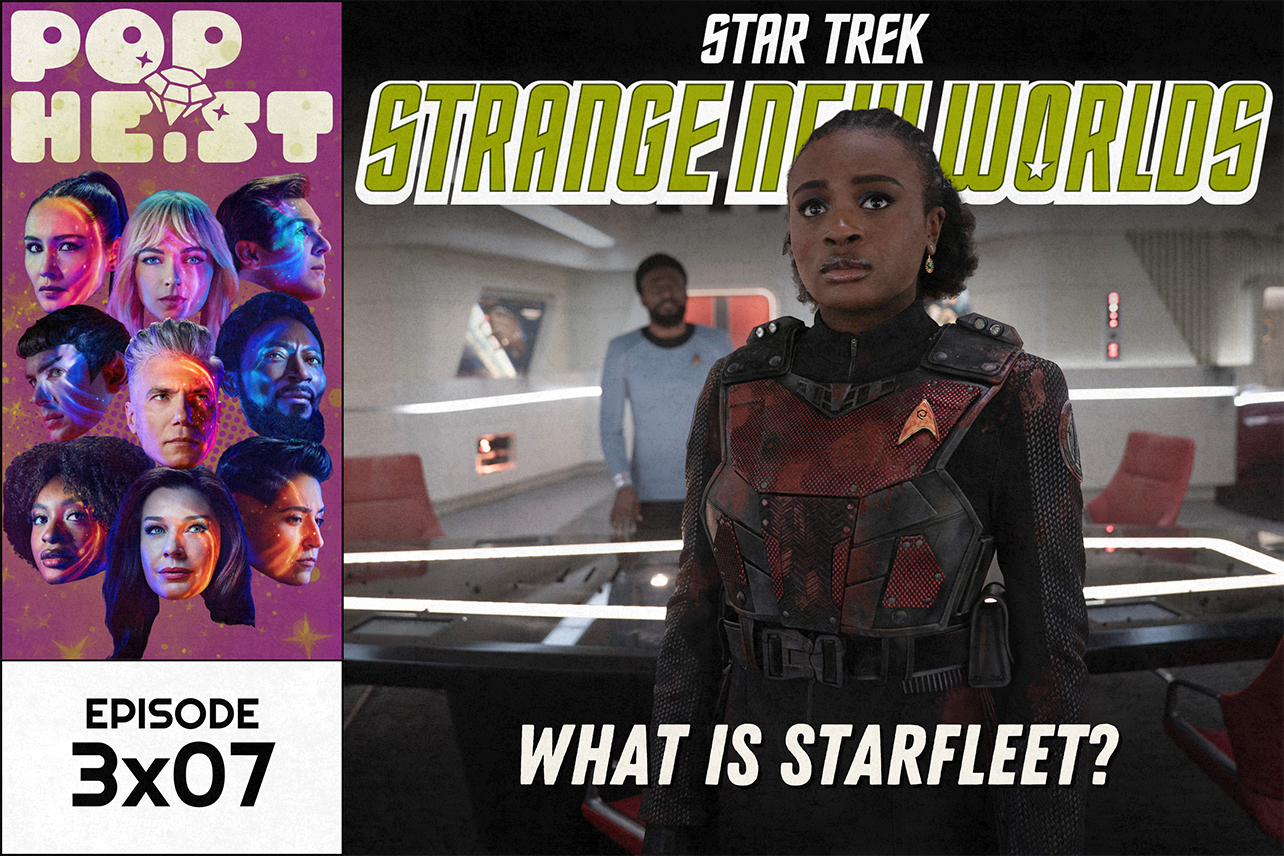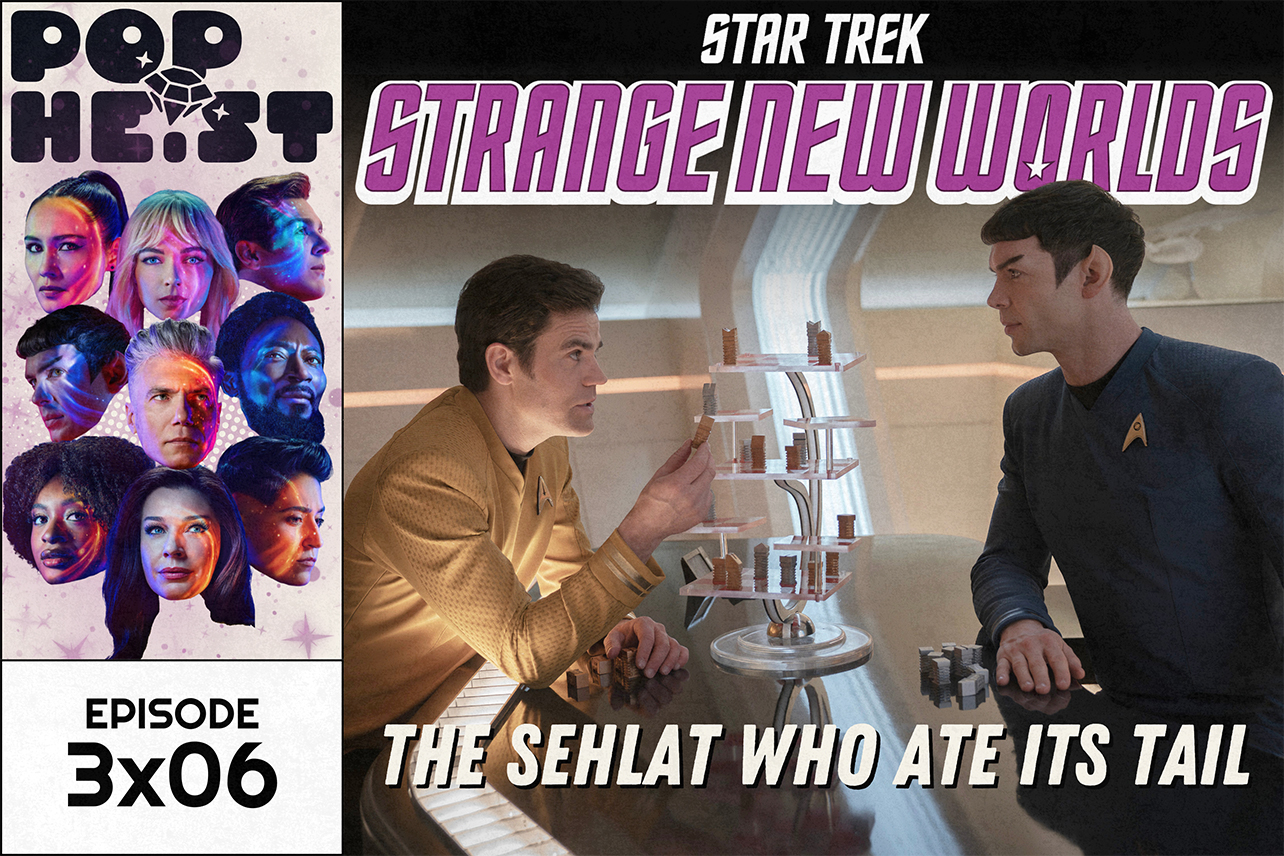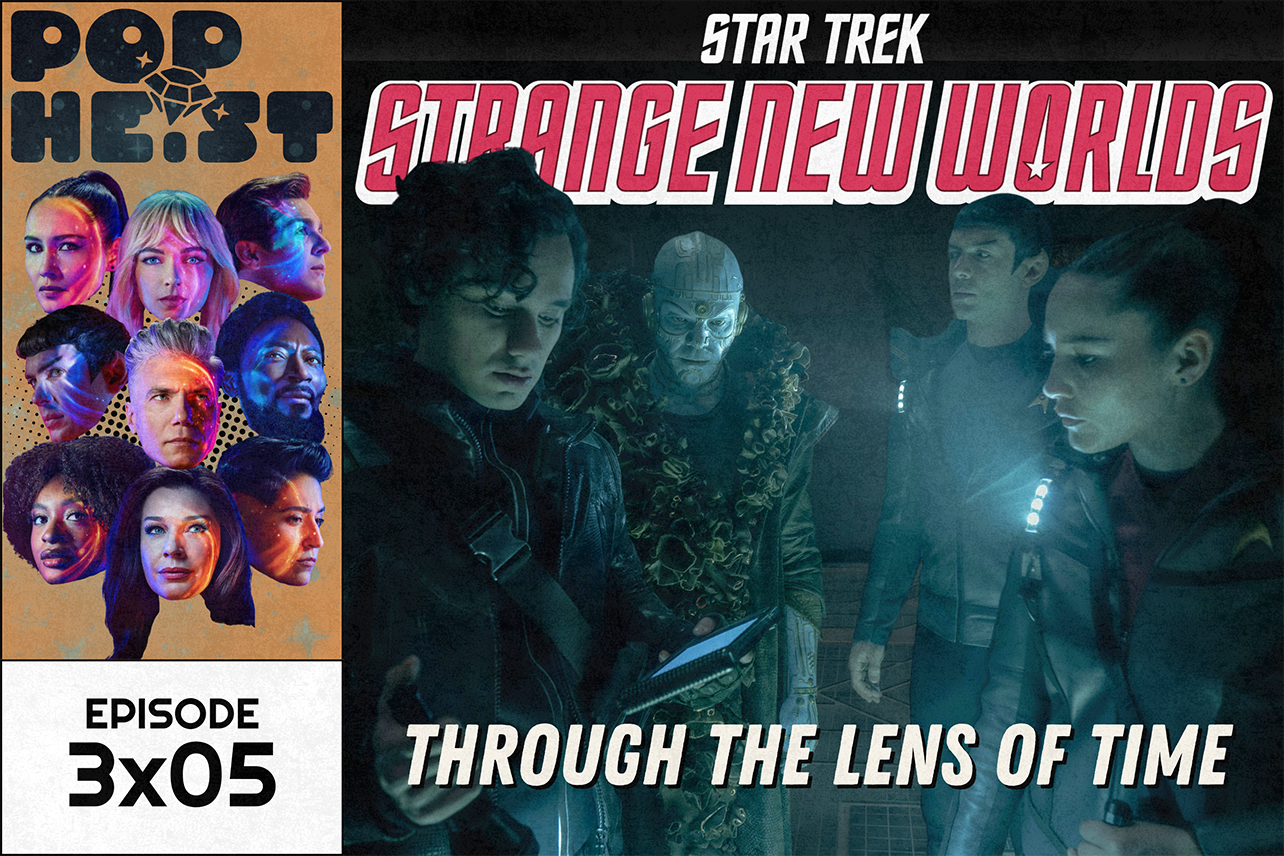On July 3, 2025, the "One Big Beautiful Bill" passed in the United States House of Representatives. That same day, X account @ReasonUnchains posted:
"17 million people just lost health care. 18 million kids just lost school meals. 3 million Americans just lost food assistance. And $3.5 trillion was added to the deficit."
In a since-deleted response, Wisconsin House of Representatives member Derrick Van Orden retweeted the post with one word: "YES!"
I have fretted for weeks over how to open this article concerning the new season of Star Trek: Strange New Worlds' place among the weekly horrors of American totalitarianism. Not because I'm worried about getting scooped or reiterating what someone else has already said to diminishing effect. But because the ground of our own increasingly strange, new world keeps shifting so quickly that there's something earth-shatteringly awful happening seemingly every few hours.
Still, there's something about the full mask-off celebration of millions of American citizens perishing terribly and completely unnecessarily, which feels moment-defining. Like Fiji is to Seahaven Island in The Truman Show, this moment in America's history feels as far from Star Trek's optimistic future as we can possibly go.
Yes, in "Encounter at Farpoint" Star Trek: The Next Generation predicted an era of atomic horrors. But even if those come to pass in the real world, they will only occur because so many people, both in America and the world over, believe in this moment that it can't happen to them — just to the perceived "bad people" who deserve it.
And what could be more anti Star Trek than that?
Not every episode of a Star Trek show should self-seriously hold a mirror up to the moment. Strange New Worlds, for example, excels at hijinks, one-off episodes, and assorted silliness. But when it does attempt to speak to something larger, we should ask ourselves: is the mirror image held up accurate or does it warp in a way that speaks more to the creator than the world they occupy?
And that is precisely what we're going to do together across the next ten weeks — ask ourselves how Star Trek: Strange New Worlds' third season is meeting the moment. But before we venture onward (and we will touch on the first five episodes of season three before we conclude), let's look back at the first two seasons, because SNW has some all caps SHIT TO SAY about our world.
Right from its pilot, Star Trek: Strange New Worlds hits the ground running. In that first episode, the Enterprise contends with a world that uses reverse-engineered Federation technology to invent a warp bomb. The alien planet is split across two factions in a state of perpetual conflict. And this warp bomb is seen by one side as a means to win that conflict. Meanwhile, Captain Christopher Pike faces his an internal struggle of his own: He knows that in 10 years he will essentially die; he believes he cannot stop it; and he doesn't know how to be an effective captain with that foreknowledge.
These two stories intersect when Pike looks at this alien world and realizes they, too, are racing toward a fate they likely all feel unable to avoid. So Pike beams down and tells the planet's leaders of humanity's history. And in the Star Trek universe, the real world insurrection of January 6, 2021, by Donald Trump supporters leads to a second civil war; which leads to a eugenics war, and eventually to World War III. Pike posits that a warp bomb will yield a similar result for these people.
Pike offers this choice: Assume an inevitable outcome, or join the Federation and reach for greater. "Until our last moment, the future's what we make it," he says. Pike may be talking to aliens on some far-off world, but Star Trek is talking to us. At the time of the pilot episode's airing, there was a real sense of dread that, despite the peaceful-adjacent transition of power from Trump to Biden, we all stood helplessly on the precipice of the end of the world. And Star Trek, hopeful in a moment of hopelessness, said, "It ain't over 'til it's over."
This opening story met the moment well. It acknowledged what's literally happening in the world, accepted that inevitability is in the air, but ultimately pointed out that the choice is still in our hands — at least a little bit. As opening gambits go, Star Trek: Strange New Worlds' first move was bold, but it doesn't stand alone.
SNW can be inconsistent on its "fate vs. free will" messaging. The pilot episode, for example, is immediately followed by "Children of the Comet," an episode where the Enterprise saves a planet from the titular comet only to discover the comet itself knew the Enterprise would do just that. The story ends on a decidedly "what we thought was free will maybe wasn't" message with a kind of bemused energy.
And more strangely, with the Season 1 finale "A Quality of Mercy," SNW indicates that not only must Pike's fate remain static, but, if it doesn't, Spock specifically will pay the price. In that story, a future version of Pike even insists that Spock must live, because only he can perform certain tasks in the future. It's a surprisingly "chosen one" narrative, which feels very much at odds with the "the future's what we make it" sentiment we started with.
Across the characters and stories of Star Trek: Strange New Worlds we get what I would deem inconsistent messaging. For example, in "Serene Squall," Angel, an honest to goodness transgender nonbinary person, has a conversation with Spock about embracing individual identity. They posit that Spock need not embrace a purely Vulcan or human philosophy, but rather embrace that he is neither, both, and ultimately his own thing.
But also, Angel, the only trans nonbinary person to feature on SNW, is an evil space pirate who kidnaps the crew and is okay with killing everyone if necessary. You see what I mean? Mixed messaging.
There's a middle territory here that I think best represents the mean of what Star Trek: Strange New Worlds does vis-à-vis holding up mirrors to the real world — and that's regarding Illyrians.
The Illyrians are a group who continually adapt their genetics in order to thrive in their surroundings. But because of the Eugenics Wars on Earth, augmented beings are not allowed to be part of the Federation. In the episode "Ghosts of Illyria," we witness Illyrians save Pike and Spock's life while also discovering that the Enterprise's first officer, Una Chin-Riley, is secretly Illyrian. Pike insists he will protect her from Starfleet, but casually suggests he'll do so because she's "one of the good ones."
Then Una gets arrested and winds up in prison anyway.
In the resulting story, "Ad Astra Per Aspera" (which translates to English as "To the Stars Through Hardship"), we see Una on trial, and we witness the Federation face how its own laws, however well intentioned, do active harm. Illyrians are ostracized, face hate crimes and deportation, and often must conceal who they are at great personal risk. Una was once a child in danger seeking a way out. That way out was Starfleet. The very system whose laws oppress her are also her salvation. She's also an exemplary officer whose service saved countless lives.
But more than anything, Una is someone who just came out as Illyrian and knows about quiet survival, not loud advocating. "Ad Astra Per Aspera" isn't just her story; it's the story of her Illyrian defense attorney (and former friend) Neera. Neera uses the Federation's own laws to prove that, while Una broke the law in one respect, she also followed it in another. As an oppressed being in danger, she sought aid from the Federation. And in telling Pike she is an Illyrian, she effectively requested asylum — which is her legal right. All the Federation needs to do to end this case and reinstate Una as first officer of the Enterprise is grant that asylum.
Neera says she loves the law. "A law is not a mirror to society," she explains. "A law is an idea. A beacon to remind us how to be our better selves. All I am asking you to do today is to be your better selves and enforce the law that favors my client with the same dispassion as the laws that would exclude her."
And that is exactly what happens. Una's case is dismissed and she returns to active duty a free woman. However, her fellow Illyrians, Neera included, remain exiled.
On the one hand, Star Trek: Strange New Worlds says unequivocally that punishing "augmented people" is wrong. But it also suggests that freedom only comes through slowly fighting unjust laws. And that is a tough pill to swallow when, here in the real world, unjust laws are oppressing, torturing, and killing so many people.
With "Ad Astra Per Aspera," Star Trek: Strange New Worlds walks a very fine line. It expresses a fact: People should be free regardless of race, religion, or creed while acknowledging fights for freedom aren't won in a day. Neera even says she still holds little love for the Federation. However, Una's case opens a door for more Illyrians in the future. And Neera points out that the Enterprise's crew now proudly serves an Illyrian commander.
"It's a start," she says.
So I lied a little. Star Trek meeting the moment isn't about holding up a mirror — it's about honestly reflecting where we are, however bleak that might be, and then reminding us how to be our better selves. Ad astra per aspera. To the stars through hardship.
Which brings us to the present day — and, boy, has there ever been a lot of hardship between Star Trek: Strange New Worlds’ second and third seasons. A Republican house representative cheerleading human suffering barely scratches the war-driven, genocidal surface. And unfortunately, Star Trek faces handicaps on two fronts here.
Firstly, the gestation for SNW season three is protractedly long due in part to labor disputes. Scripts were written back in spring 2023 with filming fully commencing in December of that same year. The world has changed a lot since then, making it virtually impossible for this season to intentionally speak to what's happening in the ever-shifting torment nexus that is 2025.
But television writers are often a mixture of savvy and lucky enough to still hit the bullseye, even when they're writing years in advance. The larger scale struggle comes from Paramount itself.
It is no secret that Paramount is seeking to merge with Skydance. And similarly, it has been well publicized that the man who might keep that from happening is President Donald J. Trump. Back in February, a memo to employees from Paramount co-CEOs George Cheeks, Chris McCarthy, and Brian Robbins revealed that Paramount intends to alter its diversity initiatives to "comply" with Trump's new anti-DEI mandates. This raised anxieties across the board. But for Star Trek, in particular, it becomes incumbent to ask: How can a show founded on diversity retain its ideals if those ideals are tamped down to satisfy a power mad dictator?
And now, with Star Trek: Strange New Worlds’ third season imminent, Paramount has gone even further, settling a lawsuit with President Trump out of court to the tune of $16 million. Why? Because Trump insists a CBS interview with then-presidential nominee Kamala Harris was edited to make her look good. Despite no evidence whatsoever to support Trump's claim, Paramount leadership acquiesced, likely at least in part to hasten the FCC approval of that Skydance merger.
This decision, as well as other behind-the-scenes choices, has been deeply unpopular. 60 Minutes executive Bill Owens resigned in protest. Wendy McMahon, now former CBS News president, was made to step down. Accusations that this entire decision amounts to a "bribe" to the president are in the air with U.S. Sen. Ron Wyden of Oregon going so far as to say that Paramount will have to "explain their crimes in front of Congress and to the public when Democrats retake power."
How much, if at all, this will impact Star Trek moving forward is unknown. Season 3 of Strange New Worlds is long since completed. But last-minute edits happen. And the show itself still has two more seasons to complete production on.
We likely won't know what changes (if any at all) are made to keep Star Trek in line with whatever decisions Paramount makes to align with America's increasingly draconian laws. But if the goal of the next 10 weeks is to ask "How is Star Trek meeting the moment?", it would feel irresponsible to do so without the awareness that our real world, in many ways, impacts the world of Star Trek — and that potentially includes the fallout of this settlement. How much will Star Trek's creative team be able to maintain their own free will and how much is fated to be out of their control?
Which brings us, at long last, to Star Trek: Strange New Worlds season 3. Screeners for the first five episodes are out there, and I have seen them. Keeping in mind that the goal is to watch (and, indeed, rewatch) this season together, I don't want to say much. However, there are two points I feel make for a relevant starting place.
For one thing, this season of SNW is a lot more fun-focused than its predecessors. Of those first five episodes, two are straight-up comedies with the remainder falling under action, and, perhaps most interesting of all, horror. But throughout these five stories it's hard not to feel as though each adventure is comparatively light. None of them feel like morality plays. And while I wouldn't be writing these articles if I didn't think there was something worth saying, it feels like what mirror-holding statements exist here are less intentional and more incidental.
One specific exception I want to speak to beforehand involves a scene from one episode in particular. In it, we see a number of heterosexual couples dancing together jubilantly. Meanwhile, one of the show's few queer-coded characters stalks off, a mix of rage, fear, and trauma. I don't think the writers of Star Trek: Strange New Worlds necessarily intended it, but that moment holds up a particularly ugly mirror up to our real world. Among the many oppressed groups suffering through Trump's regime, queer people in particular are seeing their health care and their rights in general stripped from them at an alarming rate.
Strange New Worlds, aware of it or not, certainly speaks to that in some small way for at least one episode. We'll find out together how, or if, the show's team finds a way to offer us hope in these dark times as well. Until then: ad astra per aspera. To the stars through hardship.
